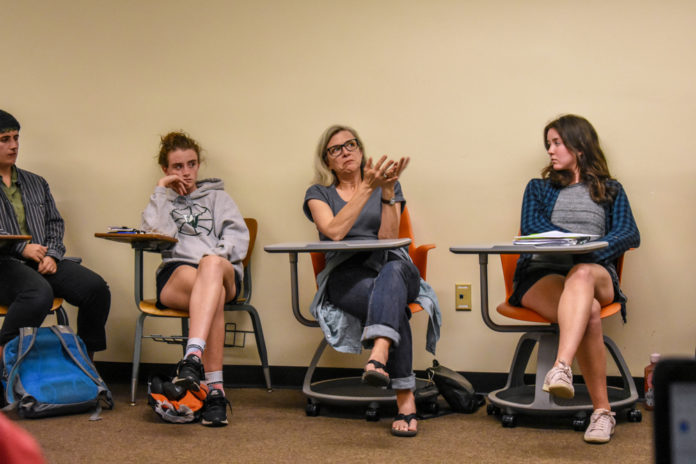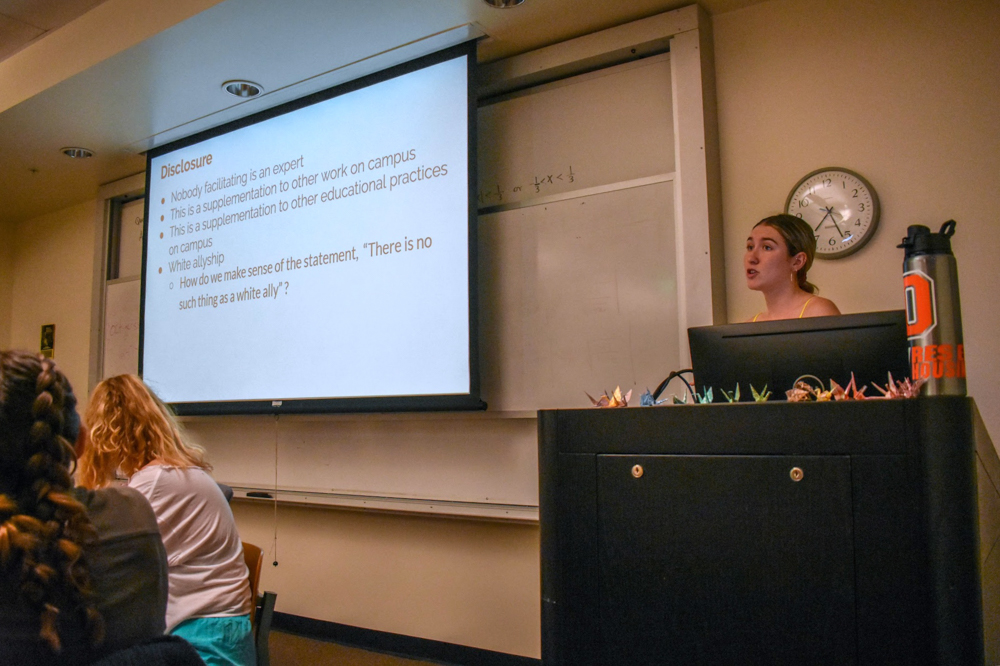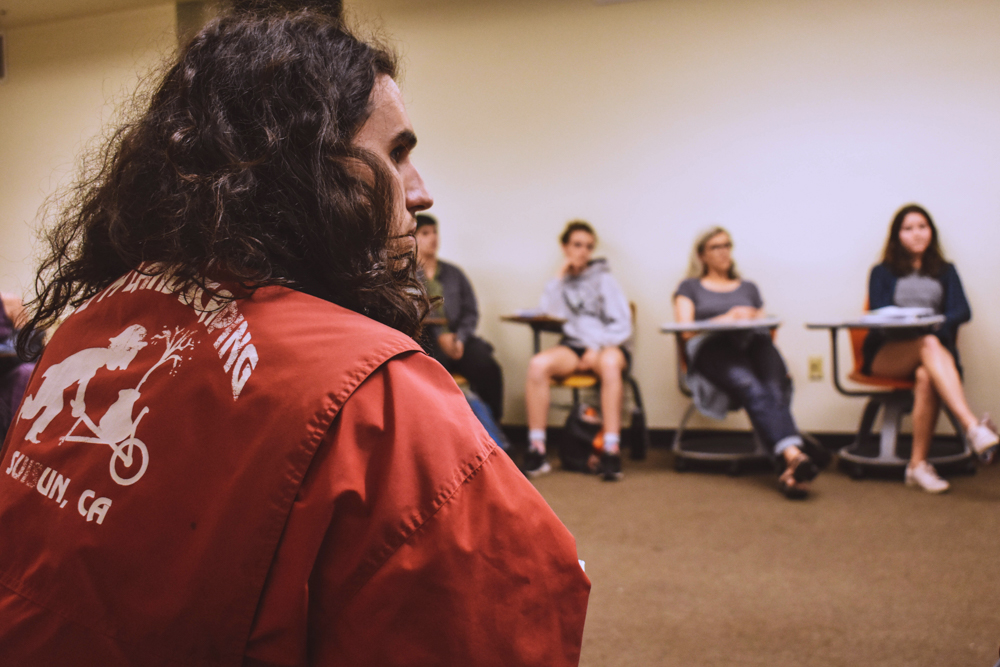
The Oxy Alliance of White Anti-Racists Everywhere (Oxy-AWARE) hosted a “Whiteness Teach-In” event in Fowler Hall April 24. Oxy-AWARE is an affiliate of AWARE-Los Angeles, a volunteer-based association of white anti-racists who organize to advocate for racial justice and challenge racism in alliance with people of color. The event was facilitated by Lexi Banbury (senior) and Sandy Pattison (senior), with additional facilitation conducted by Mark Anella (sophomore), Miranda Gruber (sophomore) and Lachlan Ashenmiller (sophomore). Banbury said the event’s goal was to discuss white supremacy, whiteness and its intersection with colonialism and anti-blackness.
Banbury said Oxy-AWARE is meant to remove the burden of explaining white supremacy and anti-blackness from the shoulders of students of color and marginalized identities.
“I think it’s very much black students at Oxy and students of color at Oxy [who] usually are the students putting on educational events, [the] students teaching white students, exposing trauma for white students to learn,” Banbury said. “One of the purposes of the space is to learn from whiteness and learn from white people and from each other, and unpacking theory instead of always relying on students of color to teach white people.”
The facilitators began their discussion with a disclaimer, reminding participants that Oxy-AWARE meetings should be used as a supplement to other work and educational practices on campus. The event continued with a reading and discussion of AWARE-LA’s explanation as to why they organize white people, entitled “Why a White Space?” The group discussion that followed included both general comments on and critiques of AWARE-LA’s explanations. Banbury said Oxy-AWARE constantly engages in critiques of AWARE-LA, with the purpose of ensuring that the space engenders as productive and critical discussion on whiteness as possible.
“I think there’s a constant critique and rethinking of it because it’s such a weird concept and [a] concept that can be problematic really quickly,” Banbury said.

According to professor Amy Tahani, Oxy-AWARE started Fall 2016 when she taught American Studies 101: United States in Redux, which was a community-based learning and research course. The class collaborated with several grassroots organizations such as Black Lives Matter Pasadena, White People 4 Black Lives, Asians and Pacific Islanders for Equality.
Tahani said it was this extensive community-based collaboration in conjunction with the black diasporic theory taught in the course that pushed several white students, particularly Sam Royall ’18 and Pattison, to create an intentional space for white students. Such a space would be used to discuss whiteness, anti-blackness and how to show up as “co-conspirators” instead of white “allies” in the fight for black liberation. According to Tahani, being an ally is a passive position.
May – August, 2017, Pattison utilized a summer research grant to research the efficacy of white anti-racist organizations. She continued to attend AWARE-LA and White People 4 Black Lives meetings throughout the summer and spring. Oxy-Aware was then established in Fall 2017, according to Pattison.
“I was looking at the ways in which these larger national organizations were doing it and kind of borrowing from that, but also changing it for an academic context,” Pattison said.

Tahani serves as the faculty adviser for Oxy-AWARE, working to ensure that the organization is showing up and listening to their fellow non-white and especially black students.
“This is a central tenet of the work of Oxy-AWARE: All the work is done with transparency, active listening, and accountability towards communities of color, especially Black communities,” Tahani said via email.
At the April 24 event, discussion focused on theories of humanism and dualism, as well as the history of chattel slavery and global anti-blackness. The event also discussed Zionism and anti-Semitism, with Banbury leading a discussion on how the state of Israel perpetuates anti-Semitism and the connections between Zionism and white supremacy. The discussion focused on recent events on campus, including the blackface and “Aryan Alliance” photographs in past editions of the La Encina yearbook, the controversy of revoking a honorary degree to known eugenicist Paul Popenoe, the non-tenure track professors’ march for unionization, Students for Justice in Palestine’s Israeli Apartheid Week and the formation of the ASOC Direct Action Committee and its subsequent demands.
The event ended with attendees breaking into small groups to discuss specific actions that white students need to take. Questions included: “How do you envision productive white anti-racist action on an individual scale?”, “How about on a community/organizational scale?” and “Why do we generally feel discomfort in this work?”
Ashenmiller and Banbury said that in preparation for the event, Oxy-AWARE’s reached out to other student organizations, such as the Black Student Association, the South Asian Student Association, the Latinx Student Union, the Student Labor Alliance and the Diversity and Equity Board, in order to get feedback and suggestions as to how to best conduct the discussions.
Ashenmiller spoke about Oxy-AWARE’s effort to maintain an intentional white space.
“That’s something that we wrestle with every time we’re organizing a meeting and trying to put together an agenda and looking at creating questions that feel productive, so that it doesn’t just turn into a white support group, [which is] something that we’re always walking a very fine line upon,” Ashemiller said. “Also knowing when to step in as a facilitator … if someone does say something that’s problematic or … that veers away from the intent of this space. It’s challenging, because you sort of have to meet people where they’re at, but also challenge them to think outside the ways that they’ve been trained to think.
Referencing the recent campus controversies, particularly the blackface incident and the resignation of professor Courtney Baker, associate professor of American studies and department chair of black studies, Tahani spoke about the importance of non-black campus constituencies being accountable to black students. She believes conversations regarding the oppression caused by whiteness and the acknowledgment that all white-identifying people contribute to the systematic oppression of non-white people is imperative at Occidental, Tahani reminded both white-identifying students and non-black students of color that they hold power and privilege that can be used to instill equity on campus. Tahani said students should focus on becoming co-conspirators rather than white allies.
“That is how white, and nonblack POC, should frame their efforts today,” Tahani said via email. “Listen and act as you are invited to do by your POC, especially Black, peers.”
![]()






























